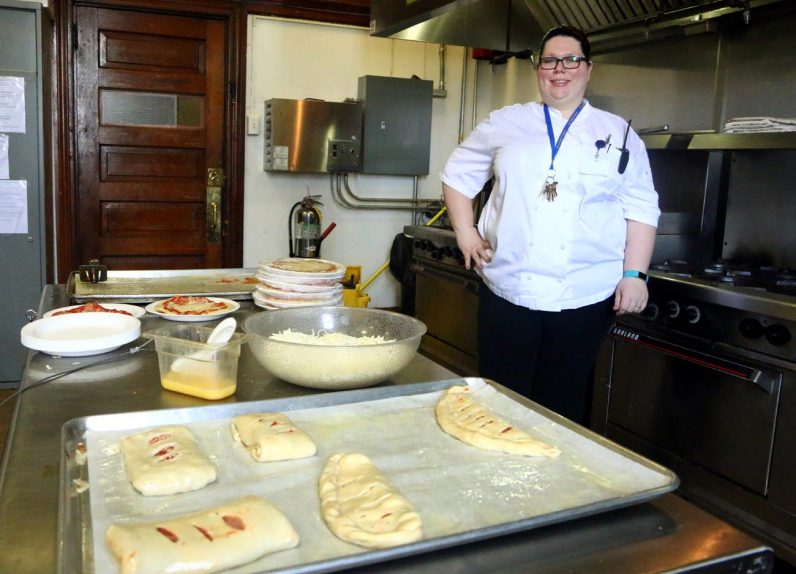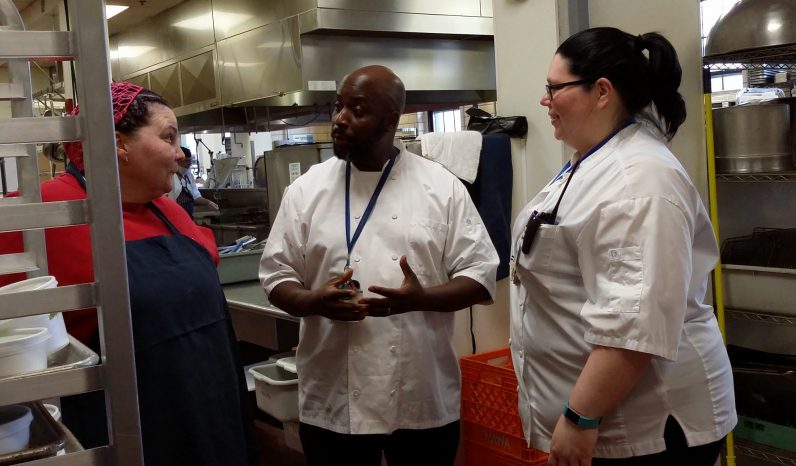
Eileen Hasty, who directs the culinary arts program at St. Gabriel’s Hall, provides students with skills that ensure success in both the kitchen and in life. (Photo by Sarah Webb)
Mix one part stir-fry and one part Scripture, throw in a dash of patience and humor, and you have a recipe for changing young lives.
Chefs Eileen Hasty and Malcolm Cain combine food and faith in their work at St. Gabriel’s Hall, a residential treatment program for adjudicated youth. Located in Audubon, Montgomery County, the school is part of St. Gabriel’s System, a division of archdiocesan Catholic Social Services (CSS). At present, 143 young men between the ages of 11 and 18 are enrolled at the hall, which is accredited by the Middle States Association of Colleges and Schools.
Hasty heads up the school’s culinary arts program, which enables students to earn professional certification, while Cain oversees the in-house food services division, where students gain hands-on experience by preparing meals for residents and staff.
[hotblock]
Both chefs view their careers as divinely inspired vocations.
“We’re not just showing them how to cook,” Hasty said. “We’re feeding their souls, and we’re modeling what life is really about.”
Lessons in cooking — and life
In her kitchen classroom, Hasty trains the students in both culinary arts theory and practice, teaching them how to create healthy meals from scratch, while drilling them in food safety principles and French terms used by professional chefs.
She develops her lesson plans using curriculum materials from ServSafe, the nation’s leading food safety association, and from Johnson and Wales University, her alma mater. After several months of 90-minute classroom sessions, students take the ServSafe manager’s exam, earning a certificate that enables them to work at thousands of restaurants throughout the country.
“My main goal for each of these boys is to make them employable,” Hasty said.
Even if students choose not to enter the restaurant industry, Hasty knows that she and Cain are imparting lessons that will benefit the young men throughout life.
“It’s about providing for yourself, being responsible, cleaning up after yourself, not wasting anything, being conscious of where your money’s going and how you’re spending it,” she said. “For these boys to leave here with a skill that enables them to spend $20 and eat for three days is empowering for them.”
Cain, who adopted a vegan diet, began introducing the students to a wide variety of foods, including tofu, international cuisine and gluten-free options.
“Our boys have active minds, and they always want to try new things,” said Cain, adding that St. Gabriel’s often provides the students’ first real experiences of achievement and encouragement.
“Many of them have never had an adult say, ‘Hey, you’re doing a great job,’” Cain said. “Then they make a batch of chicken noodle soup, and it’s something new to them, and they say, ‘Wow, I made this soup, and everybody’s eating it.’ Look what that does to someone’s self-esteem.”

Chefs Malcolm Cain (center) and Eileen Hasty (right) discuss the St. Gabriel’s Hall culinary arts program with staff member Sue Morris. Through a mix of food science and faith, the program works to transform the lives of at-risk youth. (Gina Christian)
After years of working for the federal prison system, Cain knows how crucial it is to instill youth with a sense of purpose and potential. Throughout his career, he has blended his passion for cooking with a deep desire to mentor others – including Hasty, with whom he previously worked at De La Salle in Town, a center city Philadelphia-based division of St. Gabriel’s that closed in 2014.
Hasty believes she was providentially guided to collaborate with Cain. After taking four years off to focus on raising her children, she was looking to return to culinary arts, but was dead set against going back to teaching in the field.
“And every time I went online and looked, I kept seeing the job at De La Salle,” she said. “So I finally said, ‘All right, God, message received.’”
“We were waiting for her,” said Cain.
Prayer as the key ingredient
Both chefs, who were reunited at St. Gabriel’s Hall during the past year, rely on their faith to sustain their frequently challenging work. Many times, students at St. Gabriel’s struggle to overcome backgrounds fraught with poverty and violence.
“Without my prayer life, I could never provide the patience and kindness they need from us,” said Hasty, who attends both Our Lady of Consolation Parish in Philadelphia and St. Ann Parish in Wilmington, Del., where she and her family now live.

Students in the culinary arts program at St. Gabriel’s Hall prepare meals with a mix of enthusiasm and creativity. (Gina Christian)
Cain, a member of Holy Cross Parish in Philadelphia, draws on the Scriptures to fulfill his daily mission.
“I think about what Jesus did with five loaves of bread,” he said. “We sometimes work with limited resources, and we try our best to make a way when there seems to be no way.”
Cain and Hasty are steadily expanding the school’s culinary arts initiatives. Now that students are increasingly comfortable with preparing entrees, the chefs are planning to offer instruction in baking from scratch.
“Miracles happen if you stay consistent, wake up every day, and go to work,” Hasty said. “And I tell that to the boys all the time. Opportunity will find you; you just have to show up.”
PREVIOUS: Accord helps equip Phila. church workers with business skills
NEXT: Forum looks at pope’s first 5 years, ponders his vision for church


Share this story